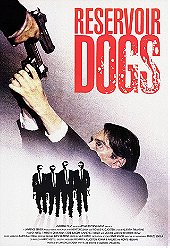It's been an unusually good year for the discovery of first-rate new American film directors: Barry Primus ("Mistress"), Nick Gomez ("Laws of Gravity"), Allison Anders ("Gas Food Lodging") and Carl Franklin ("One False Move"), among others. Now add to the list the name of Quentin Tarantino, the young writer and director of "Reservoir Dogs," a small, modestly budgeted crime movie of sometimes dazzling cinematic pyrotechnics and over-the- top dramatic energy. It may also be one of the most aggressively brutal movies since Sam Peckinpah's "Straw Dogs."
"Reservoir Dogs" is about a Los Angeles jewelry store robbery masterminded by a tough old mob figure named Joe Cabot (Lawrence Tierney). The principal characters are introduced in an extended precredit sequence in which the thieves are seen relaxing over lunch sometime before the job.
The camera looks on with the indifference of a waitress who expects no tip. One guy holds forth on the meaning of the lyrics of popular songs, with special emphasis on the oeuvre of Madonna. His discoveries are no more profound than those of academe, but his obscene jargon, which disgusts some of his colleagues, is refreshingly blunt and more comprehensible than any deconstructionist's. It's a brilliant scene-setter.
Cut to the initial postcredit sequence, just after the heist has been carried out and two of the hoods, played by Harvey Keitel and Tim Roth, are fleeing the scene. Mr. Keitel is at the wheel of the car while Mr. Roth lies across the back seat, bleeding badly and clutching his stomach as if to hold in the organs. Something obviously went wrong. One of the hoods became panicky during the holdup and began shooting. It's also apparent that the police had been tipped off. Mr. Roth begs to be taken to a hospital, or just dumped somewhere near a hospital, but Mr. Keitel refuses. They go on to the warehouse where the gang members were to meet according to the original plan.
Though all of the film's contemporary action takes place inside this warehouse, "Reservoir Dogs" cuts back and forth in time with neat efficiency to dramatize the origins of this soured caper. One of the elements of old Joe's plan was the anonymity of the men he hired for the job, to protect them from one another and from the police.
To this end he gave them noms de crime (Mr. White, Mr. Pink, Mr. Orange and so on), which especially offends the man dubbed Mr. Pink, who thinks it makes him sound like a sissy. In the course of the film, some of the men do reveal their real names, which leads to a certain amount of confusion for the audience when the men are talking about characters who are off screen.
Though small in physical scope, "Reservoir Dogs" is immensely complicated in its structure, which for the most part works with breathtaking effect. Mr. Tarantino uses chapter headings ("Mr. Blonde," "Mr. Orange," etc.) to introduce the flashbacks, which burden the film with literary affectations it doesn't need. Yet the flashbacks themselves never have the effect of interrupting the flow of the action. Mr. Tarantino not only can write superb dialogue, but he also has a firm grasp of narrative construction. The audience learns the identity of the squealer about mid-way through, but the effect is to increase tension rather than diminish it.
"Reservoir Dogs" moves swiftly and with complete confidence toward a climax that matches "Hamlet's" both in terms of the body count and the sudden, unexpected just desserts. It's a seriously wild ending, and though far from upbeat, it satisfies. Its dimensions are not exactly those of Greek tragedy. "Reservoir Dogs" is skeptically contemporary. Mr. Tarantino has a fervid imagination, but he also has the strength and talent to control it.
Like "Glengarry Glen Ross," another virtually all-male production, "Reservoir Dogs" features a cast of splendid actors, all of whom contribute equally to the final effect. Among the most prominent: Mr. Keitel, whose moral dilemma gives the film its ultimate meaning; Steve Buscemi, as the fellow who has thought long about the messages in Madonna's songs; Mr. Roth, the English actor who gives another amazing performance as a strictly American type; Chris Penn, as Mr. Tierney's son and heir; Michael Madsen, as a seemingly sane ex-con who isn't, and Mr. Tierney, who more or less presides over the movie.
The film also marks the American debut of Andrzej Sekula, the Polish-born director of photography. Mr. Sekula's work here is of an order to catapult him immediately into the front ranks. One of the principal reasons the film works so well is the sense of give-and-take that is possible only when two or more actors share the same image. Mr. Sekula and Mr. Tarantino have not been brainwashed by television movies. They don't depend on close-ups. "Reservoir Dogs" takes a longer view.
Pay heed: "Reservoir Dogs" is as violent as any movie you are likely to see this year, but though it's not always easy to watch, it has a point.
nyt
 Login
Login